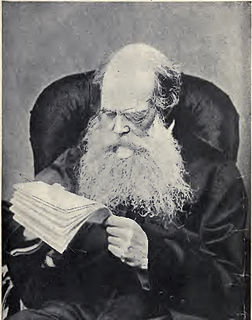A Quote by Maximilien Robespierre
The revolution is the war of liberty against its enemies. The constitution is the rule of liberty against its enemies. The constitution is the rule of liberty when victorious and peaceable.
Quote Topics
Related Quotes
When a judge goes beyond [his proper function] and reads entirely new values into the Constitution, values the framers and ratifiers did not put there, he deprives the people of their liberty. That liberty, which the Constitution clearly envisions, is the liberty of the people to set their own social agenda through the process of democracy.
The distinguishing part of our constitution is its liberty. To preserve that liberty inviolate, is the peculiar duty and proper trust of a member of the house of commons. But the liberty, the only liberty I mean, is a liberty connected with order, and that not only exists with order and virtue, but cannot exist at all without them. It inheres in good and steady government, as in its substance and vital principle.
What we must remember, however, is that preservation of liberties does not depend on motives. A suppression of liberty has the same effect whether the suppressor be a reformer or an outlaw. The only protection against misguided zeal is constant alertness to infractions of the guarantees of liberty contained in our Constitution. Each surrender of liberty to the demands of the moment makes easier another, larger surrender. . .
The liberty I mean is social freedom. It is that state of things in which liberty is secured by the equality of restraint. A constitution of things in which the liberty of no one man, and no body of men, and no number of men, can find means to trespass on the liberty of any person, or any description of persons, in the society. This kind of liberty is, indeed, but another name for justice.
Anarchism is for liberty, and neither for nor against anything else. Anarchy is the mother of co-operation, yes, just as liberty is the mother of order; but, as a matter of definition, liberty is not order nor is Anarchism co-operation. I define Anarchism as the belief in the greatest amount of liberty compatible with equality of liberty; or, in other words, as the belief in every liberty except the liberty to invade.
For Dicey, writing in 1885, and for me reading him some seventy years later, the rule of law still had a very English, or at least Anglo-Saxon, feel to it. It was later, through Hayek's masterpieces "The Constitution of Liberty" and "Law, Legislation and Liberty" that I really came to think this principle as having wider application.
In the blood-heat of pursuing the enemy, many people are forgetting what we are fighting for. We are fighting for our hard-won liberty and freedom; for our Constitution and the due processes of our laws; and for the right to differ in ideas, religion and politics. I am convinced that in your zeal to fight against our enemies, you, too, have forgotten what you are fighting for.
Tree of Liberty: A tree set up by the people, hung with flags and devices, and crowned with a cap of liberty. The Americans of the United States planted poplars and other trees during the war of independence, "as symbols of growing freedom." The Jacobins in Paris planted their first tree of liberty in 1790. The symbols used in France to decorate their trees of liberty were tricoloured ribbons, circles to indicate unity, triangles to signify equality, and a cap of liberty. Trees of liberty were planted by the Italians in the revolution of 1848.
Liberty lies in the hearts of men and women; when it dies there, no constitution, no law, no court can save it ... The spirit of liberty is the spirit which is not too sure that it is right; the spirit of liberty is the spirit which seeks to understand the minds of other men and women; the spirit of liberty is the spirit which weighs their interests alongside its own without bias.
The Constitution of our country [was] formed by the Fathers of liberty... Exalt the standard of Democracy! Down with that of priestcraft, and let all the people say Amen! that the blood of our fathers may not cry from the ground against us. Sacred is the memory of that blood which bought for us our liberty.
There are some troubles from which mankind can never escape .... have never claimed that liberty will bring perfection; they simply say that its results are vastly preferable to those that follow from authority .... As a choice of blessings, liberty is the greater; as a choice of evils, liberty is the smaller. Then liberty always says the Anarchist. No use of force except against the invader.





































